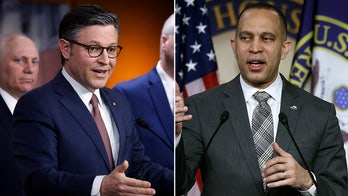A Kansas jury last week recommended that the man who raped and killed 19-year-old Jodi Sanderholm two years ago be put to death -- a verdict that could be the state's last death sentence because of the country's dire economic straits.
Kansas Republican state Sen. Carolyn McGinn, who has proposed a bill to overturn the death penalty in the state, is one of a growing number of legislators nationwide who are citing drained resources and severe budget cuts as a reason to ban capital punishment.
"We're looking at any way we can to save money moving forward in the state of Kansas," McGinn told FOXNews.com. "This will save significant money -- money that could be used toward education programs and toward community corrections programs," she said.
Colorado, Kansas, Maryland, Montana, New Hampshire, Nebraska and New Mexico are among those states actively considering abolishing executions as a way to cut costs. But in other states, including Texas and California, the debate has gained little ground.
The proposal has infuriated many who say the death penalty cannot be decided in dollars and cents.
"You cannot put a price on justice," said Kansas Attorney General Stephen Six. "Our death penalty statute is a useful tool for law enforcement as they bring justice to families devastated by heinous and violent murder."
Another person who strongly opposes abolishing the death penalty is Jodi Sanderholm's mother, Cindy, who told FOXNews.com that she wants her daughter's murderer to die.
"We saw the brutality that he did to our daughter, and he truthfully deserved it. He could have changed his mind in those five hours he tortured her, and he didn't. How can they waive that?"
In the case of murderer Justin Thurber, they almost certainly won't. He will face execution by lethal injection if the judge formally sentences him to die on March 20. But Thurber could turn out to be the last killer to face the ultimate punishment in Kansas. McGinn's measure -- if passed -- will take effect on July 1.
A 1992 estimate in Texas -- which has had more executions than any other state since the U.S. Supreme Court reinstated the death penalty in 1976 -- showed that death row cases cost taxpayers $2.3 million per case, compared to $750,000 for life sentence cases.
McGinn cited a 2003 state audit that reported the median cost for death penalty cases in Kansas was $1.26 million through execution, while non-death penalty cases cost $740,000 through the end of a prisoner's incarceration.
McGinn said legal fees related to death row cases make up a large expense for states, which often have to pay the costs of both the prosecution and defense in capital punishment trials.
"When you add all those costs up and weigh it against that individual being isolated and locked up for the rest of his or her life, it's a much greater cost," said McGinn. She said capital murder trials, on average, cost 16 times more than non-death penalty cases. The appeals cost 21 times more, she said.
But the cost factor is just one reason McGinn opposes the death penalty. She calls it a flawed system that is anything but just. Critics say the death penalty entraps minorities and the poor who often cannot afford competent legal representation.
"Approximately 40 percent of the folks on death row are African-Americans -- and they represent only 12.2 percent of our entire population," McGinn said.
The effort to abolish the death penalty has been met with great resistance, particularly by state attorneys general and victims' rights groups. The Kansas attorney general said the 2003 state study relied on data reported by "interested parties -- not actual costs -- and projections that are acknowledged to be speculative."
"Since the death penalty was reinstated in Kansas, no reliable study has been conducted to compare the actual costs of death penalty cases versus cases with life sentences. The study being used by proponents states very clearly that '[i]t is not a study of whether it is more costly for Kansas to have the death penalty than not to have it,'" Six told FOXNews.com.
But McGinn refuted that charge, saying the report included data from law enforcement officials, the American Bar Association and the state attorney general's office.
Attorney General Six and others opposed to the measure say capital punishment is a useful tool for prosecutors and a deterrent for criminals looking to commit heinous acts.
"It is by exacting the highest penalty for these individuals -- whose brutal, vicious acts have taken a life and whose conduct demonstrate they have forfeited their right to live among us -- that we recognize the value of the life taken," Six wrote on his Web site.
McGinn countered that the death penalty may bring no more closure to families than life sentences without the chance for parole.
"This measure is not to diminish the pain and suffering these families have gone through," McGinn said.
"I don't stand in her shoes," McGinn said of Sanderholm's mother, "but nobody seems to talk about the pain that these families go through because of the countless appeals that these murderers are given because they're on death row."




